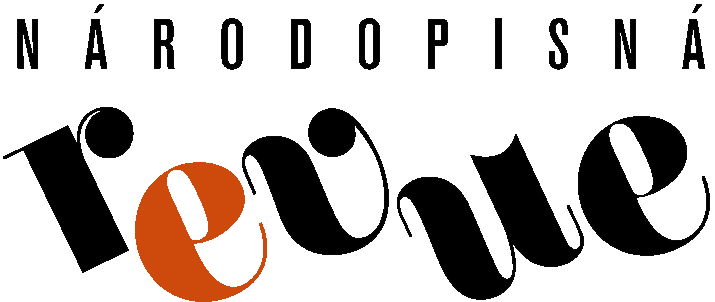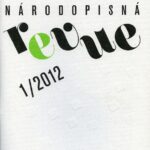Journal of Ethnology 1/2012 is devoted to wanderlust, travelling and cultural contacts. Barbora Půtová focuses her study on fortunes and works of three important Czech travellers - E. S. Vráz, A. V. Frič and J. Kořenský (Czech Travellers and Ethnographers on the Boundary of Civilizations: Vráz, Frič and Kořenský). Jana Jiroušková pays attention to the personality of M. B. Lány (1876-1941), who spent his life as an Evangelic missionary in East Africa and included his observations and knowledge into the correspondence and collection he sent to Bohemia. (A Proud Warrior, a Lazy Maidservant and a Superstitious Native. One of the European Views of Non-European Culture). Stanislav Brouček presents the fortunes of Helena Šťastná-Bübelová (born 1920), who created her relationship to Africa between 1946 and 1947 as a traveller, and between 1948 and 1964 as an expatriate (Africa as a Traveller’s Experience and a Place to Live for a European: (Story of Helena Šťastná-Bübelová).
Kateřina Štěpánová writes about the travellers´ relationship to the creation of exotic collections within the Czech environment. (The Influence of Czech Travellers on Exotic Art Collections / since the Beginnings of Czech Collections until the World War II).
In Stopping with Photos column, Hana Dvořáková presents a selection from photo albums compiled by Jindřich Vávra, Knight Fernsee (1831-1887), a ship doctor, botanist and donator of the Moravian Museum. Transferring Tradition column includes a Tereza Indráková contribution about the contemporary Israeli dance (Dancing Israel), an Eva Šipöczová article about the actual political anecdote in Slovakia (The Government Fell! The Government Fell! Who Will Form a New One?) and an Eva Večerková contribution about a producer of traditional Easter eggs (Easter Eggs Made by Anna Rusová). Social Chronicle remembers the anniversaries of Slovakian ethnologist Oľga Danglová (born 1941) and Czech ethnologist Miloš Tomandl (born 1952), and publishes obituaries for ethnologist Olga Skalníková (1922-2012), Slovakian folklorist and worker in public education Kliment Ondrejka (1929-2011) and composer Blahoslav Smišovský (1931-2011). Other regular columns include reports from conferences, reviews of new books, and actual professional activities.
Czech Travellers and Ethnographers on the Boundary of Civilizations: Vráz, Frič and Kořenský
This study is a theoretic analysis of lives and works of three Czech travellers - Enrique Stanko Vráz, Alberto Vojtěch Frič and Josef Kořenský. These pioneers of the nascent social and cultural anthropology found themselves on the boundary of different civilizations and were among the first white men who set their foot on the exotic world of "the others". With their travels, vividly described in their literal work, they not only did an extraordinary job when gathering authentic ethnographic material in the form of literature, photographs and exotic artefacts in Czech cultural context, but they also deconstructed the doctrine of Eurocentrism. The study focuses mainly on their literal heritage and their desire to describe, understand and interpret a different cultural reality. Works of these travellers represent original effort to integrate collecting, observing and research intentions. The study presents their travel books as a specific gnoseologic tool enabling to analyse their field findings ranging from the description to the comparison and interpretation of the exoticism and unknown socio-cultural reality. The study also points out the fact that the travellers transformed the different in their books into a cultural construction created within the author's personality and his own civilization. Through the strange and different, the travellers thus gave rise to an authentic and complex picture of a different and unknown world including, however, also the author's own description and interpretation of different forms of cultural reality. This study also aspires to prove that the works of these travellers represent their different personal approaches to perception of cultural boundaries and to their studies of different ethnicities and nations.
A Proud Warrior, a Lazy Maidservant and a Superstitious Native: One of the European Views of Non-European Culture
The article focuses on the historical reconstruction of a vision of “exotic” reality. The example chosen is that of former missionary, Martin Bohdan Lány (1876-1941), a man whose determination is documented by the surroundings and the time he lived in. M. B. Lány was a long-term co-worker of the Náprstek Museum to which he sent several hundred objects from 1903 to 1911 from East Africa in the area around Mount Kilimanjaro. His choice of objects influenced the perception of East African culture in Bohemia and contributed to the creation of several stereotypes associated with the local population: a proud warrior or a patient, less intelligent governess. The study is based on an evaluation of the primary sources stored in the archives of the National Museum - Náprstek Museum of Asian, African and American Cultures.
Africa as a traveller’s experience and a place to live for a European: (Story of Helena Šťastná-Bübelová)
The study is based on the thesis that travelling has become a part of the process of globalization. On the one hand, it covers the unbridled tourism while on the other hand one can see wanderlust as a state of soul. The text pays attention to the second line, observing the fortunes of Helena Šťastná-Bübelová, an important Czech traveller, who was travelling through Central Africa between 1946 and 1947. After February 1948, she became an expatriate; before settling in the south of France at Cap Ferat near Nice (1965), she worked in Kenya, got married, and lived with her second husband in Madagascar for many years (1953-1964). The study is based on the personal experience of the traveller in various civilizations. In addition to the materials obtained from Helena Šťastná-Bübelová, (written materials: correspondence, notes, and her African diary published in book form), the study also includes the observations of her friends, for example traveller Miroslav Zikmund.
The Influence OF Czech Travellers on Exotic Art Collections
The study introduces the Czech travellers who helped form the exotic art collections in the Czech Republic significantly and supported the relationship between Czech culture and non-European nations in this way. The author pays attention to the terminology and the first collections of exotic art within the Czech Republic. She points out not only the importance of exotic art but also the interesting stories of artefacts appearing in our collections. The next part of the study presents Czech travellers whose contribution to the theme was the most essential ((Vojtěch Náprstek, Emil Holub, Enrike Stanko Vráz, Alberto Vojtěch Frič, Josef Kořenský, Joe Hloucha, Jiří Hanzelka and Miroslav Zikmund, Miloslav Stingl etc.); the development, present condition and listing of institutions exhibiting the exotic collections cannot be missing. The author puts stress on ethnological, anthropological, and artistic aspects of the theme that - even if not preferred by the present society - had a fundamental influence on forming the attitude of Czech culture to the distant civilizations. The travellers play one of the most important roles within this theme.



